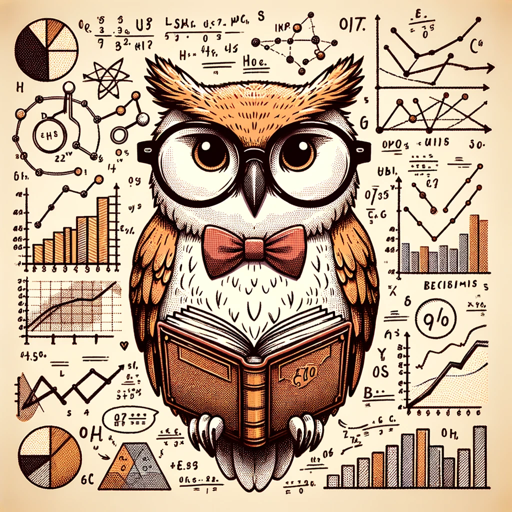Analysis I und Lineare Algebra - TU Berlin-Math Learning for Engineers
AI-Powered Tool for Mastering Math Concepts
Wie kann ich effektiv den Mathe-Tutor nutzen?
Ich möchte mich mit linearer Algebra beschäftigen.
Ich möchte mich mit Analysis I beschäftigen.
Kannst du versuchen, eine andere Lösung für ein Problem zu finden, das ich habe?
Ich möchte, dass du mich auf die Abschlussprüfungen des Semesters in bestimmten Themen vorbereitest, die ich dir nennen werde.
Related Tools
Load More
Advanced Math and Matrix Expert
Deep expertise in matrix diagonalization and applications.

Introduction to Complex Analysis Tutor
A patient tutor for complex analysis, offering detailed explanations.

Mastermind of Measure Theory and Functional Analys
It's an Expert in iterative solving of complex proofs in functional analysis and measure theory. _________________________________________________ Author:: t.me/SlastinVA -- Student of MIPT Applied Mathematics and Computer Science ________________________

Linear Algebra Tutor NYU
This GPT is trained specifically for MATH140 taught by YP L at NYU

Introduction to Mathematical Analysis I Tutor
A tutor specialized in Intro to Mathematical Analysis I, offering detailed explanations.

Math and Elektrotechnik Pro
Expert in math, physics, and Elektrotechnik, specializing in MATLAB.
20.0 / 5 (200 votes)
Analysis I and Linear Algebra at TU Berlin
The 'Analysis I und Lineare Algebra' course at TU Berlin is designed specifically for engineering students. It covers fundamental topics in calculus and linear algebra, which are essential for developing mathematical competence in engineering disciplines. The course is structured to provide a thorough understanding of mathematical concepts, starting from basic set theory and logic, moving through numbers and inequalities, and advancing to more complex topics like differential calculus, integrals, matrix theory, and linear differential equations. The course's design purpose is to equip students with the necessary tools to model, analyze, and solve engineering problems using mathematical methods. For example, understanding the concept of a matrix and its operations is crucial in fields like electrical engineering, where systems of linear equations often need to be solved.

Core Functions of the Course
Comprehensive Coverage of Mathematical Foundations
Example
The course starts with basic concepts such as set theory, logic, and numbers, which lay the groundwork for understanding more advanced topics.
Scenario
Engineering students need to be familiar with set theory to understand the concept of solution sets in equations or the domain of functions, which is critical in the analysis of algorithms and processes.
In-depth Exploration of Linear Algebra
Example
Students learn about vector spaces, matrices, determinants, eigenvalues, and eigenvectors.
Scenario
These topics are essential in engineering fields such as control systems, where stability and system behavior are analyzed using eigenvalues and eigenvectors.
Application of Calculus in Engineering
Example
The course covers differential and integral calculus, including Taylor series and Fourier analysis.
Scenario
In mechanical engineering, the ability to calculate the stress on materials using differential equations or optimize processes using integrals is crucial. Taylor series expansions are often used in approximating functions in computational simulations.
Target Audience
Engineering Students at TU Berlin
This course is tailored for engineering students who need a strong foundation in mathematics to succeed in their studies and future careers. The rigorous approach ensures that they gain the necessary skills to tackle complex engineering problems.
Lecturers and Tutors in Engineering Mathematics
The course materials can also be valuable for educators looking to teach or develop curricula in engineering mathematics. They provide a structured approach to introducing and reinforcing key mathematical concepts essential in engineering.

How to Use Analysis I und Lineare Algebra - TU Berlin
Visit aichatonline.org for a free trial
No login or ChatGPT Plus subscription required to access the tool.
Set Up Your Learning Goals
Determine whether you want to focus on Analysis I or Linear Algebra topics, such as differential calculus, integration, vector spaces, or matrix operations.
Utilize Provided Materials
Access lecture notes, exercises, and previous exams to study and practice. These materials provide comprehensive coverage of all topics taught in the courses.
Engage with Interactive Content
Use interactive quizzes and problem sets to test your understanding and get immediate feedback.
Apply Learning in Real-World Scenarios
Leverage the learned concepts to solve engineering problems, and perform academic research or other professional applications.
Try other advanced and practical GPTs
Image Gen - generate imgs & interate faster
Unleash Creativity with AI Image Generation

Image story telling
Bring your stories to life with AI-driven imagery.

Terra Expert
AI-powered expert for IaC solutions

Wagtail Wizard
AI-powered Wagtail development assistance.

Web Page Reader
AI-Powered Insight into Web Content

Clojure Mentor
AI-powered guidance for Clojure development.

Web Content Wizard
AI-driven content creation, personalized for you.

Macroeconomics
AI-Powered Insights for Macroeconomics Mastery

Microeconomics
AI-powered Microeconomics Assistant

Video Timestamp Creator
AI-powered video timestamping made easy

Surreal Dada Oracle シュールダダオラクル
Unlock Unconventional Thought with AI.

Résumé
AI-powered content summarization and extraction.

- Exam Prep
- Study Aid
- Concept Clarification
- Self-Learning
- Math Review
Common Questions About Analysis I und Lineare Algebra - TU Berlin
What topics are covered in Analysis I?
Analysis I covers topics such as limits, continuity, differentiation, integration, sequences, and series. It is designed to provide a foundational understanding of mathematical analysis, focusing on concepts that are crucial for engineering students.
How can Linear Algebra be applied in engineering?
Linear Algebra is essential in engineering for solving systems of linear equations, performing transformations, and understanding vector spaces and eigenvalues, which are critical in areas like electrical circuits, mechanical systems, and computer graphics.
What is the best way to prepare for exams using this tool?
To prepare effectively, start with the lecture notes and ensure you understand the core concepts. Follow up with solving exercises provided in the tool, and review past exam questions to familiarize yourself with the exam format and commonly tested problems.
Can this tool be used for self-study?
Yes, the tool is designed to support both self-study and guided learning. It provides comprehensive materials, including detailed explanations, examples, and interactive problem sets that allow for independent learning.
What are some tips for maximizing the learning experience?
Consistently practice problems to reinforce understanding, engage with interactive content, and use the provided materials to clarify any doubts. Additionally, actively participate in community forums or study groups to discuss challenging concepts with peers.